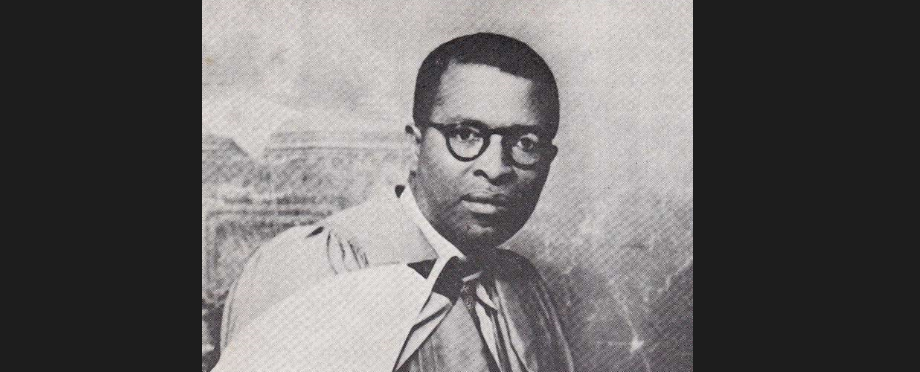
Disclaimer: Any views expressed by individuals and organisations are their own and do not in any way represent the views of The Heritage Portal. If you find any mistakes or historical inaccuracies, please contact the editor.
On 28 April 2016, Benedict Wallet Vilikazi was honoured with the prestigious Order of Ikhamanga. This National Award recognises the profound impact Vilikazi had on South African literature. In the article below Veronica Klipp from Wits University Press traces the life and achievements of this South African icon.
Benedict Wallet Vilakazi has been called the “Father of Nguni Literature”. He was born on 6 January, 1906 at Groutville Mission Station near Stanger in KwaZulu-Natal. The poet grew up in the neighbourhood of the mission station and in 1912 entered the primary school at Groutville, remaining there until he reached Standard 4. He continued his schooling at Marianhill, the Roman Catholic Monastery outside Durban, and after reaching standard 6, took a teacher’s training course.
Vilakazi’s gifts and ambitions came to the fore when he attended the Catholic Seminary at Ixopo in KwaZulu-Natal, where he devoted much of his spare time to distance education. He succeeded in matriculating, after which he taught at the Ohlange Institute in Phoenix near Durban. In 1934 he attained a Bachelor of Arts degree in African Studies. At the time, Vilakazi was already known to academics at the University of the Witwatersrand, which was in the process of publishing his first book of poems, Inkondlo kaZulu (tr: Zulu Horizons). This was the first book of poems ever published in isiZulu; it also marked the launch of the newly established Bantu (later: African) Treasury Series (published by Wits University Press), a collection of 20 classic works written between 1935 and the 1987 in African indigenous languages.
Coincidentally, the University was looking for an assistant in its Bantu Studies Department (now the Department of African Languages). At the insistence of CM Doke, at the time Head of Department, Vilakazi was appointed as Language Assistant in 1935. This appointment made him the first black African in the then Union of South Africa to teach at a white university, and it sparked a controversy: treated with suspicion by conservative whites, it was also seen as a “collaborationist appointment” (1) by some in the black political elite.
Vilakazi continued his own studies and, in 1938, was awarded a Master of Arts degree. In 1946 he reached another milestone by becoming the first black African in South Africa to receive a Doctorate in Literature (D Litt.) from Wits for his thesis The Oral and Written Literature in Nguni.
When Vilakazi entered the literary field, there were no published books of plays or poems written in isiZulu, and from 1930 onwards for 10 years, Vilakazi, HIE and RRR Dhlomo dominated the literary scene. Amal’eZulu (Wits University Press), published in 1945, was later recognized as one the best 100 African books of the twentieth century. Vilakazi also published three novels, Noma Nini! (Marianhill Mission Press), Udingiswayo KaJobe (Sheldon Press) and Nje Nempela (Marianhill Mission Press). In collaboration with Doke, he compiled the first Zulu-English Dictionary (Wits University Press). Writing in 1995, Dumisani Ntshangase asserted that Vilakazi and Doke:
produced the first major lexicographical work in an African language and this dictionary even today stands as the most successful and comprehensive project in African Languages lexicography in South Africa. (2)
In his writings, Vilakazi thought of himself as a spokesperson for his people and he identified with the struggles, fears, sacrifices and aspirations of his people. However, because of the bias towards African literature written in English – a bias that dominated academic discourse as well as debates within the resistance movement of the time – “his works have always been put in the periphery of the African intellectual history.” (3)
Vilakazi died suddenly of meningitis at Coronation Hospital at the age of 41 on 26 October, 1947, survived by five children. He was undoubtedly the most outstanding figure in Zulu literature of his time, and his funeral in Marianhill was attended by thousands of people.
References:
- Dumisani Kruschchev Ntshangase, Between the Lion and the Devil: The Life and Works of BW Vilakazi, 1906-1947. Paper presented for the Institute for Advanced Social Research, University of Witwatersrand 1995. Page 3
- Ntshangase 1995, page 2.
- Ntshangase 1995, page 1.
Comments will load below. If for any reason none appear click here for some troubleshooting tips. If you would like to post a comment and need instructions click here.
